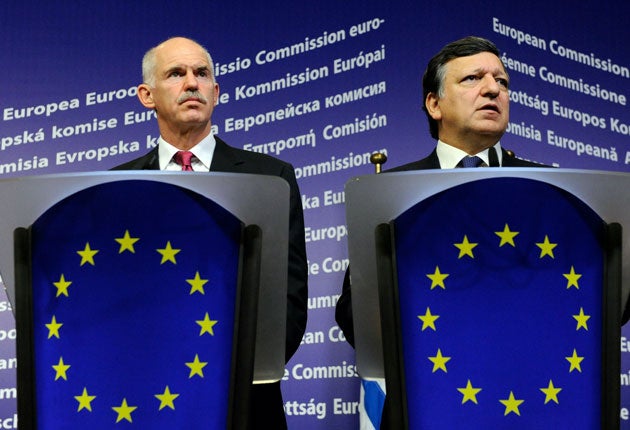Markets recoil again as EU politicians argue

The chancellor, George Osborne, meets other EU finance ministers today with no sign of the eurozone's long-running crisis abating and leaders split on the EU's next move.
Europe's troubled peripheral economies and the euro itself came under renewed pressure yesterday amid further signs of disarray over a proposal for new "E-bonds" – guaranteed by the whole eurozone – and a startling IMF suggestion that the current €770bn (£653bn) bailout fund, partly financed by the IMF, will have to be expanded.
The IMF managing director Dominique Strauss-Kahn was to present the recommendations personally to the finance ministers of the 16 nations that use the single currency at a meeting in Brussels last night. The IMF also wants to see the European Central Bank buy more government bonds.
As details of a private session between the European Commission President José Manuel Barroso, the ECB president Jean-Claude Trichet and Didier Reynders, Belgium's Finance Minister, leaked out, Mr Reynders confirmed that he believed that the IMF needs to double its backing for the EU-IMF bailout fund from €250bn to €500bn.
The euro reversed some of the gains made towards the end of last week, and the "risk premium" demanded by investors to hold Irish, Greek, Portuguese and Spanish debt over its German equivalents drifted wider again. The IMF warns that Europe's recovery could "easily be derailed" by the uncertainty, adding that further sovereign debt crises represented a "severe downside risk". There is, the IMF argues, a "strong case" for increasing emergency support measures.
Though unnamed, few observers had any doubt that the fund, as with the wider markets, had Spain in mind. The third-largest eurozone economy's sheer size, levels of debt, banking problems and slow growth represent a uniquely troublesome combination for European policy makers.
However, the IMF's suggestion is likely to be resisted by Germany, whose leaders are showing open signs of irritation at the never-ending demands on Berlin's largesse. Germany wants faster progress of the new "European Stability Mechanism", which, they hope, will mutate into a Sovereign Debt Restructuring Mechanism. This would contain a provision, for debt issued after 2013, for investors to suffer a loss if a country gets into difficulties.
Markets have been unnerved by increasing evidence of division. Proposals for "E-bonds", issued by the eurozone as a whole, have been put publicly forward by the Luxemborgeois and Italian finance ministers, Jean-Claude Juncker and Giulio Tremonti; Mr Juncker is chair of the eurozone group of finance ministers. Despite such heavyweight backing, the idea was summarily dismissed by their German counterpart, Wolfgang Schäuble.
Mr Schäuble said such new instruments could not be introduced without treaty changes and "as long as we have national competence fiscal policy, we cannot give up the incentives and sanctions for members of the eurozone [to ensure] discipline in their national budget polices". A definitive new policy is likely to have to wait for the full EU leaders' summit next week.
Subscribe to Independent Premium to bookmark this article
Want to bookmark your favourite articles and stories to read or reference later? Start your Independent Premium subscription today.

Join our commenting forum
Join thought-provoking conversations, follow other Independent readers and see their replies